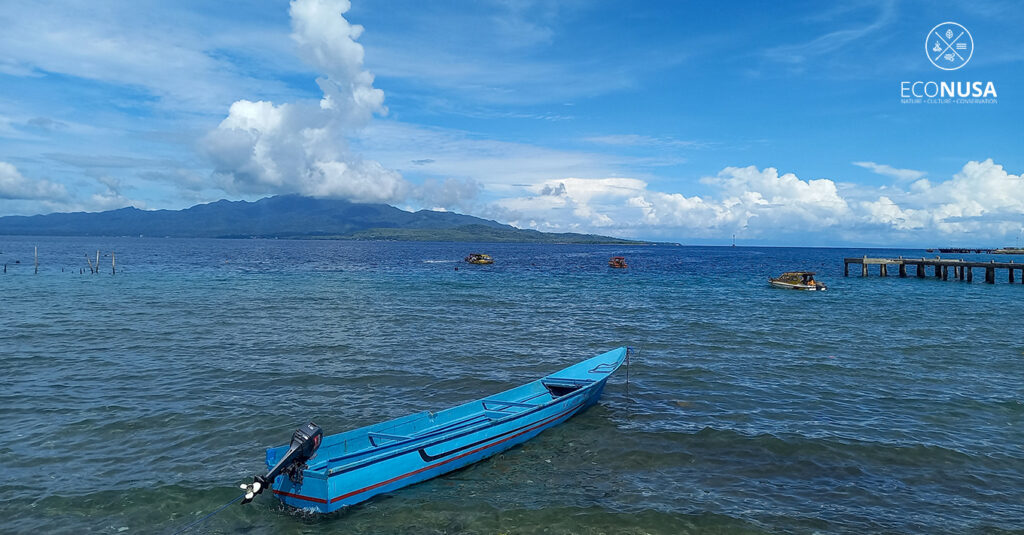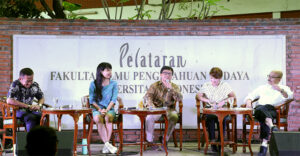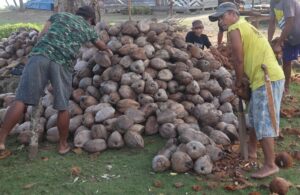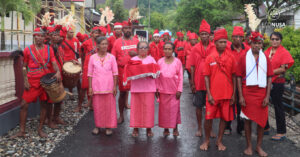
The abundant maritime and fisheries resources in Haruku Island District, Central Maluku Regency, Maluku Province, requires a set of regulation to assure equality and sustainability aspects. The coalition of civil society provided assistance to the community in Kabauw Village in Haruku Island to draft village regulation that binds not only indigenous people but also other parties to protect coastal areas protection and resilience.
“The Law No. 6/2014 on Village provides broader space to indigenous people to care and manage the customary areas. The governance of coastal areas with positive law is very crucial so that external parties could comply with the regulation,” said Ode Zulkarnain Sahji Tihurua, one of the developer team of Kabauw Village regulation in the focus group discussion (FGD) entitled “Customary Area-based Local Governing Area”.
According to the Jala Ina Foundation board, the development of village regulation here is urgent to protect coastal and water areas in Haruku Island, particularly in Kabauw Village. Despite the existing destructive fishing ban such as bombing as mandated by the regulation and ministerial regulation, the public compliance level is poor. “Therefore, the village regulation with customary rules which are commonly not written will bind all community elements,” said Ode.
Read also: Menke Womom, Imminence Proof of Abun Tribe and Oceans God
Jaring Nusa dynamization driver, Asmar Exwar, appreciated the village regulation mandating the management and protection of coastal areas. The regulation here should be disseminated to inspire communities in small islands in Indonesia, particularly in the eastern Indonesia.
“There are not many regulations at local level, particularly those governing the utilization and protection of coastal, sea, and small islands resources. Therefore, Jaring Nusa as the CSO coalition focusing on the promotion of sustainable and equal coastal and sea management attempts to promote the positive sides of the regulation,” said Asmar.
The draft of Kabauw Village regulation on Protection and Utilization of Coastal and Sea Resources of Hatuhaha particularizes various stipulations such as management areas, ban, up to sanction in case of violation. The management of coastal and sea areas include mangrove areas, sea transportation activity, seagrass, coastal areas, and riverbank.
Read also: Our New Dream for Democracy and Ecology
Besides, the draft of village regulation here also stipulates the government and people of Kabauw to revitalize the degraded ecosystem of coastal resources. This could be done by, for instance, designating coastal conservation zone and establishing domestic supervisory team which will be mandated by the Regulation of Kabauw Head of Government.
M. Saleh Suat, an academic of Ambon State Islamic Institute and one of the law drafter, said that the community violating the regulation will carry a warning customary sanction and penalty without criminal sanction. Based on the Law No. 12/2011 on the Regulation Development and Home Affairs Regulation No. 111/2014 on the Technical Guide for Village, criminal sanction must not be applied on the village regulation.
Saleh said that the amount of penalty stipulated by the draft of village regulation refers to the customary penalty imposed in Papua. In Article 23, fishing using explosive and/or chemical poison will carry Rp100 million sanction to the community of Kabauw Village and external parties will be subject to Rp200 million penalty. The use of natural poison will also carry Rp500,000 penalty.
Read also: Illegal Fishing Practice Still Rampant in Indonesian Oceans
The lowest penalty of Rp10,000 is imposed to any activity of littering waste, oyster shells, cans, bottles, plastics, oil residue, diesel oil, coconut skin and stem to the beach or sea. “This is still a draft. The Central Maluku Regency’s legal division will review whether or not the sanction is too harsh. We also open for a change,” said Saleh.
Responding to the village regulation, HuMA Director Agung Wibowo, said that the draft of Kabauw village regulation has not contained the process of trial, conflict resolution, and customary court. As to Agung, the stipulations here are very important so that the village regulation does not violate human rights.
“The characteristics of indigenous people have institution. So, we cannot apply sanction without trial mechanism. It could done indeliberately, ignorantly, and the likes. Mechanism of objection is not included in the village regulation draft,” said Agung.
Read also: Blue Ecomic Implementation Not Optimum
The Indigenous Peoples Alliance of the Archipelago (AMAN) Advocacy Director, Muhammad Arman, criticized the absence of stipulation of respect and protection of indigenous people rights. Besides, Arman suggested the regulation on natural resources management to Kabauw village and other villages in Hatuhaha customary land. In addition to Kabauw, the customary areas of Hatuhaha include Kailolo, Rohomoni, Pelauw, Kariu Ori, and Hulaliu Villages.
“The village regulation imposition administratively binds the Kabauw village territories has the stipulation. Meanwhile, in Article 6 it is said that the areas of natural resource management includes coastal and sea territories in Hatuhaha customary areas,” said Arman.
Editor: Leo Wahyudi







